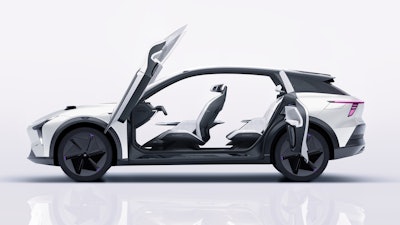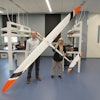
JIDU, an intelligent electric vehicle company backed by Baidu and Geely, today unveiled its first concept production robocar ROBO-01.
Highlights include an active deformable structure design, 3D borderless one-piece large screen, zero-gravity seating, AI pixel lights and dual max-computing chips. The robocar's capabilities are based on a unique "trainable" functionality and JIDU robocar neural JET (JIDU Evolving Technology), which support an autonomous driving solution with full redundancy, SOA-based intelligent cabin and millisecond-level offline intelligent voice assistant.
The robocar was unveiled at JIDU's first-ever branded event ROBODAY, held in XiRang metaverse. At the unveiling, a digital human car owner, named Xijiajia, drove and interacted with ROBO-01.
ROBO-01 comes with stronger AI perception and more active service capabilities. It is equipped with a set of fully adjustable structures, including front hood collapsible LiDAR, active liftable rear wing ROBOWing, foldable U-shaped steering wheel, liftable satellite speakers and adaptive zero-gravity seat.
The collapsible LiDAR designed by JIDU enhances the safety and stability of the intelligent driving system while strengthening the sensing capability of advanced autonomous driving. The LiDAR can be collapsed by AI intervention before a crash occurs, thus improving safety. Recently, JIDU has obtained the Chinese national patent for this technology.
The U-shaped steering wheel design of ROBO-01 can maximize the information visibility on the large ultra-clear screen. In addition, the steering-by-wire technology of JIDU can support the U-shaped steering wheel to be folded and hidden as needed, as well as enhance the variable steering ratio of the vehicle in automatic driving mode.
The spacecraft-inspired zero-gravity seats are lightweight and breathable, wrapping around the occupant, including a unique "swan neck" headrest design with an adaptive adjustment function.
ROBO-01 has the ability to recognize the user's emotions and interact with the outside world by expressing its own emotion. Its robotized front design integrates interactive AI pixel headlights and high recognition rate AI voice interaction system, enabling voice recognition function outside the car for natural communication between humans, the vehicle and the environment.
JIDU applies the full-stack Apollo autonomous driving unmanned capability and safety system. Baidu Apollo's advanced autonomous driving capabilities have been applied in its Robotaxi, with 27 million kilometers of safe autonomous driving test mileage and a large Robotaxi road test fleet conducting real road tests in more than 30 cities across China, continuously improving the autonomous driving system's ability to cope with complex urban roads.
The system is equipped with Nvidia's "dual" Orin X chips and 31 external sensors, including 2 LiDAR, 5 millimeter-level wave radar, 12 ultrasonic radar and 12 cameras. Based on JIDU's self-developed SOA cabin-driving fusion technology architecture, the industry-leading "true redundancy" solution for advanced autonomous driving is created by its technological innovation of dual systems for redundancy. The solution has been successfully tested and run on the JIDU SIMUCar (software integrated simulation vehicle), which has verified the safety and stability of JIDU's advanced autonomous driving system for mass production.
Capable of point-to-point advanced autonomous driving, JIDU's system is able to adapt to three main driving scenarios: high-speed, urban roads, and parking. The system has tested and verified ability to handle unprotected left turn, traffic light recognition, obstacle avoidance and freeway on/off ramps. Users will be able to access these and other advanced autonomous driving functions from the moment they begin driving, providing unprecedented convenience and versatility.
The intelligent cabin is equipped with advanced functions such as offline voice assistant, millisecond-level response, 3D human-machine co-driving map and full-scene interaction inside and outside the car.
JIDU is also the first to launch the 4th generation Snapdragon Automotive Cockpit Platform - 8295 chip, which has enabled the 3D presentation of the boundless integrated ultra-clear large screen, meeting users' needs of driving navigation, game entertainment, online office and other scenarios.
The millisecond-level intelligent voice response of the JIDU intelligent cabin realizes 100% coverage of all scenarios inside and outside the car, while the full offline intelligent voice function is free from reliance on network signals. In addition, its multi-modal "human-like" interaction capabilities, such as visual perception, voice recognition and lip capture, allow for "natural and smooth" communication between user and car.






















